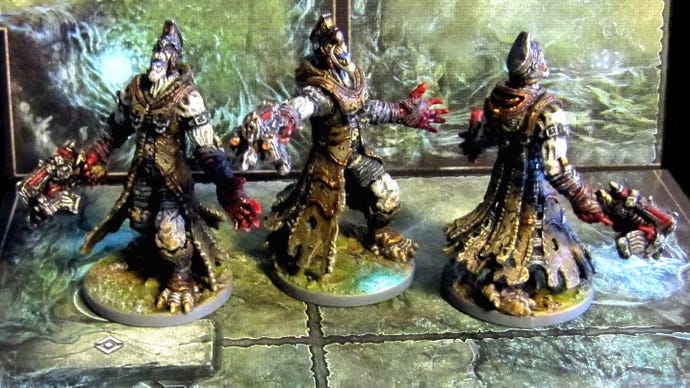What Are the Best Board Game Adaptations of Video Games?
Some board games become video games... and some video games become board games. Pete investigates the world of the licensed tabletop video game adaptation.
This article first appeared on USgamer, a partner publication of VG247. Some content, such as this article, has been migrated to VG247 for posterity after USgamer's closure - but it has not been edited or further vetted by the VG247 team.
If you're reading this, chances are you love video games. And, if past discussion in the community is anything to go by, a fair bunch of you are board game fans, too. What happens when these two worlds meet?
Well, the results aren't (always) quite as disastrous as you might fear. In fact, with many video games -- particularly those of the strategic or role-playing variety -- borrowing liberally from tabletop rulesets, the transition from pixels to cardboard often goes quite smoothly and creates some great games in the process.
Here's a selection. As ever, this isn't intended to be an exhaustive list; we'd love to hear what your favorites are, too!
Gears of War: The Board Game
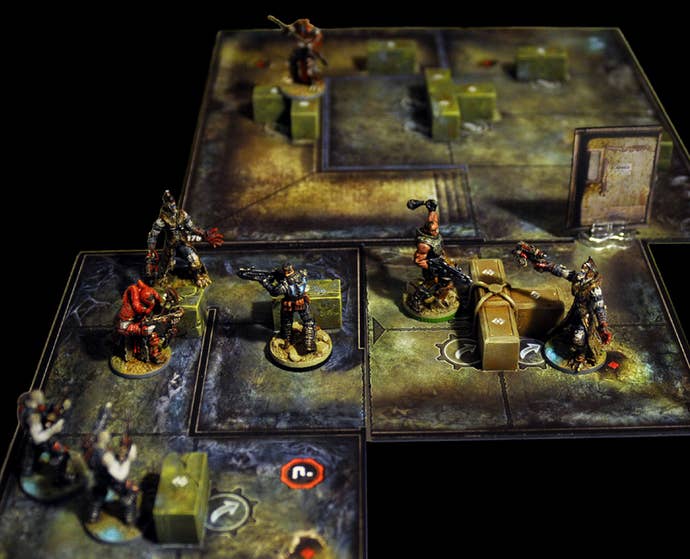
Fantasy Flight Games' adaptation of Gears of War is a cooperative game for 1-4 players. Unlike its stablemate Descent: Journeys in the Dark, with which it shares some superficial similarities -- a modular board, a variety of miniatures, variable player powers -- it doesn't require a player to take on the role of the forces of evil, instead relegating the job of running the Locusts' war effort to a deck of cards.
There are some interesting mechanics at play, too; actions are driven by cards which double as your hit points, so when strategizing, you need to weigh up how to achieve your goal versus how to leave yourself in a position to not get knocked over by a Locust breathing too heavily on you. Randomized maps for each scenario keep things interesting and, like most co-op games, victory is something that doesn't come easily, so when it does come, you feel like you've really earned it.
For those who enjoy the Gears of War series, the board game is a pretty faithful adaptation. For those who do not like the Gears of War series -- I count myself among this number -- it's a strong enough game in its own right to warrant a look. Be sure to set aside a decent chunk of time to play, though, particularly if you're going for a full four-player game -- though note that it also plays extremely well as a solo experience.
World of Warcraft: The Board Game
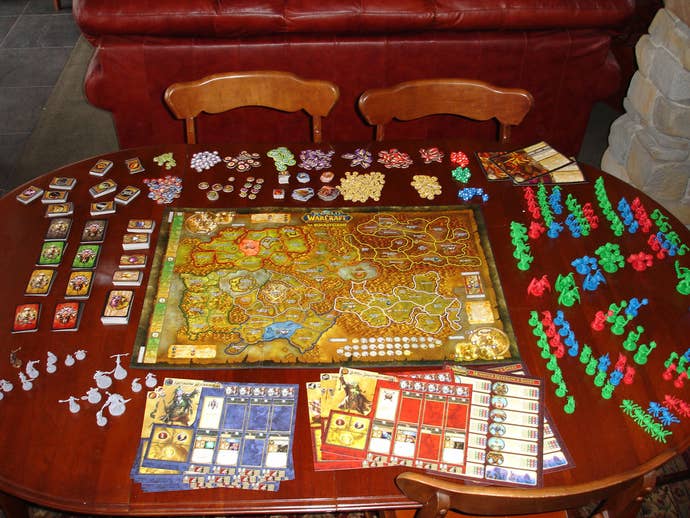
This adaptation of Blizzard's classic MMO is a somewhat divisive choice for many players, as it's a deep, time-consuming game that, when played in its standard team-based manner, can suffer a fair amount of downtime as each team plays and resolves their actions. If you have no problem with that, however, then this is well worth checking out -- so long as you have a table big enough to house its many, many bits and pieces, and a patient group of friends willing to see the experience through to its conclusion.
In World of Warcraft, two teams -- the Alliance and Horde, of course -- compete to be the first to take down one of several iconic World of Warcraft bosses... or simply be the last team standing after 30 turns have passed. This is achieved by travelling around the world and completing quests to level up in an attempt to get your team's characters into a position where they can take down the final boss without too much difficulty.
World of Warcraft's strengths lie in the impressive array of ways to play. With nine different classes to choose from, each play session can feel very distinct from the last thanks to alternative party composition and different items acquired through questing. Combat, too, is well-implemented through the use of a combination of dice and various special abilities to manipulate them.
World of Warcraft is a good adaptation of the Warcraft universe into tabletop form. Fans of the series will probably get more out of it than those who are encountering it for the first time, but it's a solid enjoyable game for players who like lengthy, deep experiences with a lot of character customization.
StarCraft: The Board Game
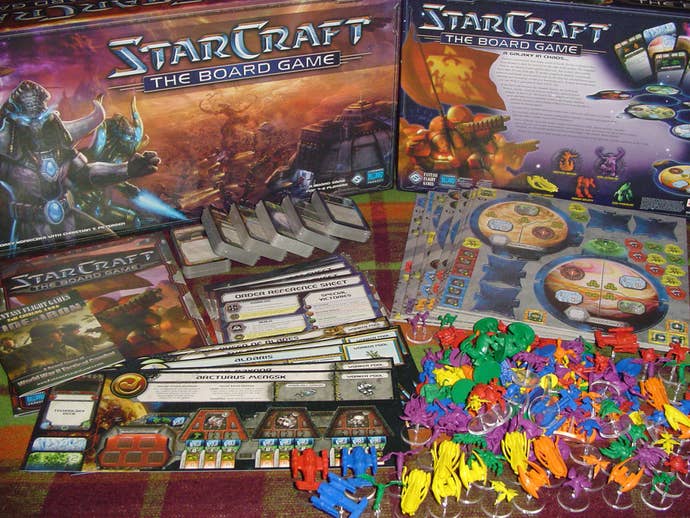
Blizzard's games make for good tabletop adaptations, it seems -- and coincidentally, this particular game is the work of the two individual designers who worked on the two games we've previously mentioned.
StarCraft's board game adaptation actually isn't all that close to the video game at all in terms of execution. Rather than focusing on smaller-scale skirmishes between two opposing bases or armies, the StarCraft tabletop game is more of a grand strategy affair in which you attempt to conquer planets in the randomly generated galaxy, then make use of the various routes between them to stomp all over your opponents with the armies you've been amassing.
StarCraft makes use of a few interesting ideas, most notably the way it depicts a three-dimensional galaxy on a two-dimensional tabletop by linking pairs of markers to one another. In this way, the game forces you to think carefully and strategically about where you are deploying your armies, since the nature of this system means that attacks could potentially come from all directions if you're not careful. The game's strategic planning system, whereby orders you place early in the turn can potentially be "obstructed" by other players later performing actions in the same location, also adds an interesting twist to figuring out what to do next, and the research mechanic is a precursor to modern deckbuilding card games.
In StarCraft, you and up to five other players take command of one of six factions -- two per each of the three StarCraft races -- and attempt to win the game in one of several ways. This can be achieved by either fulfilling your faction's unique special victory condition or by controlling planets that score victory points. Along the way, you'll harvest resources, build up your army, construct buildings and engage in card-based combat against your opponents. It's a challenging game -- and one that can go on for a long time if you let it -- but it provides an enjoyable alternative perspective on the conflicts that form the basis of the StarCraft universe.
Age of Empires III: The Age of Discovery
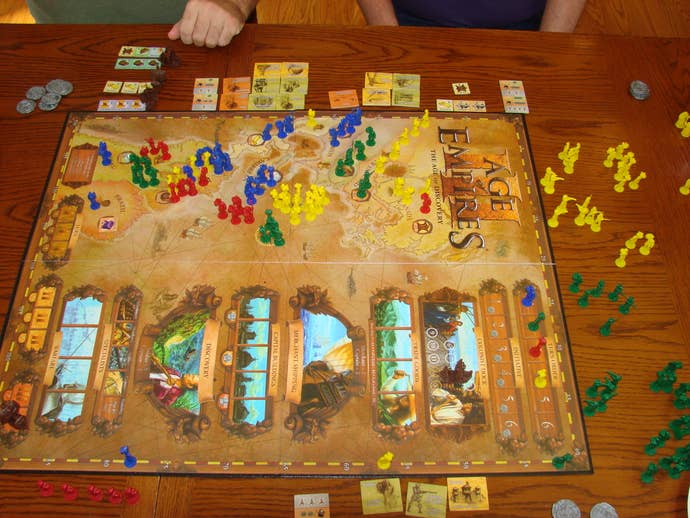
First up, don't be fooled -- this game actually bears very little resemblance to the video game version of Age of Empires III, but that's no bad thing. In fact, Sandy Petersen, one of the original PC game's designers, took to popular board gaming site BoardGameGeek to praise the game for not feeling too shackled to the conventions of the video game -- something he felt that Eagle Games' previous adaptation of Age of Mythology had suffered from somewhat. The game is actually somewhat more akin to Sid Meier's Civilization spinoff Colonization, in that you're playing explorers setting out to discover and colonize the New World.
Age of Empires III is a worker placement game with elements of area control and set collection. Each turn, you'll place your workers on various spaces in order to perform various actions. Unlike other popular worker placement games such as Agricola or Lords of Waterdeep, in Age of Empires III you have several different types available, each of which has their own special abilities. For example, the Captain piece is more valuable when attempting to claim a merchant ship, while Soldiers can be shipped to the New World in order to wage war more effectively.
Victory in Age of Empires III involves balancing your efforts between trading, discovering areas in the New World and attempting to amass enough wealth to fund your exploratory efforts. You'll also need to build up your own population of workers by training them and constructing capital buildings to unlock new capabilities.
Although bearing little resemblance to the video game, Age of Empires III is a well-regarded game that will be of particular interest to those who enjoy worker placement games or colonization-themed titles such as Puerto Rico. It's also not a game that drags on for a horrendously long time -- it shouldn't take longer than a couple of hours, tops, since the majority of the game's depth comes from making sensible strategic decisions rather than a huge array of different mechanics that take a long while to learn.
Sid Meier's Civilization: The Board Game
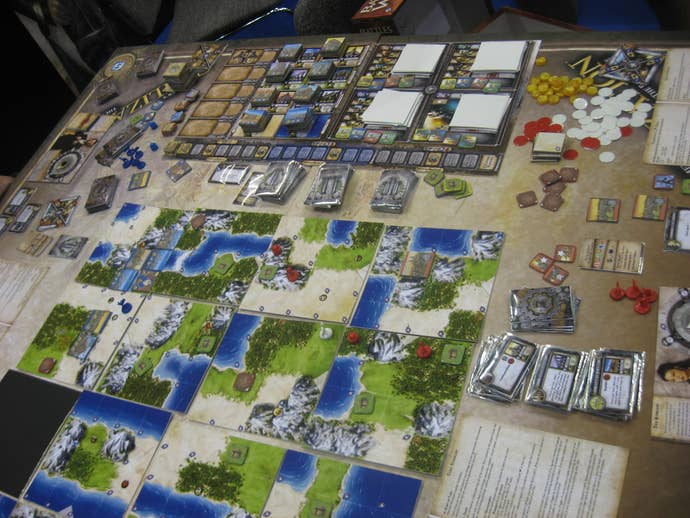
Given that Civilization is itself essentially a computerized board game, it will probably come as little surprise to see this game on the list. Rather than providing a literal translation of the video game version, however, Kevin Wilson's take on Civ unfolds on a somewhat smaller scale with a greater degree of abstraction. It's still a sprawling game that will happily take up most of your table, though, so be sure you have plenty of space on hand -- and that you have plenty of time available, as this is one that will keep you up into the small hours, particularly with more players.
Like computer Civ, there are several ways to win. You can take an opponent's capital to win a Military victory; you can earn 15 coins to win an Economic victory; you can advance your nation to the end of the Culture track to win a Cultural victory; or you can win a Technology victory by being the first to research space flight.
The Technology victory is a particularly interesting one -- rather than unfolding in a tree as in the original computer game, board game Civ's technology tree is more of a pyramid. You begin by purchasing level 1 technologies, and when you have two you can stack a level 2 technology on top of them... and so on, up until you've built a 5-tier pyramid with Space Flight atop it. There are more technologies available than you need to win a Technology victory, however, so you'll need to make some careful decisions as to which tech will benefit your civilization in the short term while you're pursuing your goal.
One of board game Civ's most interesting elements is its trade phase which, in a Settlers of Catan-esque twist, involves plenty of negotiation with your fellow players. While computer Civ can occasionally boil down to a game of "who has the best army," board game Civ lends itself to the full breadth of possible victory conditions -- and to plenty of enjoyable backstabbing along the way.
